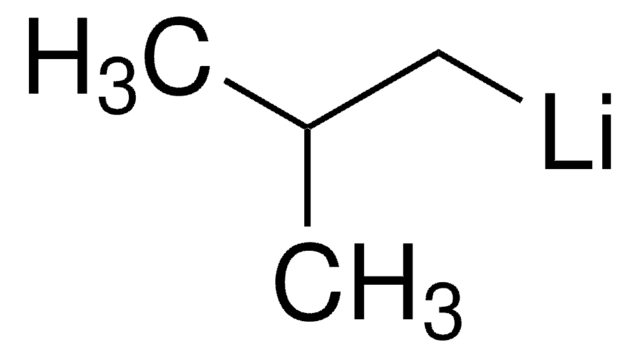302120
n-Butil-litio solution
2.0 M in cyclohexane
Sinónimos:
n-BuLi, Butil litio, Butil-litio solution, Litio-1-butanida
About This Item
Productos recomendados
form
liquid
Quality Level
concentration
2.0 M in cyclohexane
bp
80 °C
density
0.775 g/mL at 25 °C
storage temp.
2-8°C
SMILES string
[Li]CCCC
InChI
1S/C4H9.Li/c1-3-4-2;/h1,3-4H2,2H3;
InChI key
MZRVEZGGRBJDDB-UHFFFAOYSA-N
¿Está buscando productos similares? Visita Guía de comparación de productos
Categorías relacionadas
General description
Application
- A polymerization initiator to synthesize polystyrenes by anionic polymerization of styrene.
- A strong base in the diastereoselective alkylation reactions.
- A reagent to synthesize 2-benzoylpyrroles by reacting benzaldehydes with di(1H-pyrrol-1-yl)zirconium(IV) chloride complex.
Packaging
Legal Information
related product
signalword
Danger
Hazard Classifications
Aquatic Acute 1 - Aquatic Chronic 1 - Asp. Tox. 1 - Eye Dam. 1 - Flam. Liq. 2 - Skin Corr. 1B - STOT SE 3 - Water-react 1
target_organs
Central nervous system
supp_hazards
Storage Class
4.3 - Hazardous materials which set free flammable gases upon contact with water
wgk_germany
WGK 2
flash_point_f
-0.4 °F - closed cup
flash_point_c
-18 °C - closed cup
ppe
Faceshields, Gloves, Goggles, type ABEK (EN14387) respirator filter
Elija entre una de las versiones más recientes:
¿Ya tiene este producto?
Encuentre la documentación para los productos que ha comprado recientemente en la Biblioteca de documentos.
Los clientes también vieron
Artículos
Transformative reagents enable selective conversions within molecules containing sensitive functionalities under mild reactions.
Transformative reagents enable selective conversions within molecules containing sensitive functionalities under mild reactions.
Transformative reagents enable selective conversions within molecules containing sensitive functionalities under mild reactions.
Transformative reagents enable selective conversions within molecules containing sensitive functionalities under mild reactions.
Nuestro equipo de científicos tiene experiencia en todas las áreas de investigación: Ciencias de la vida, Ciencia de los materiales, Síntesis química, Cromatografía, Analítica y muchas otras.
Póngase en contacto con el Servicio técnico















